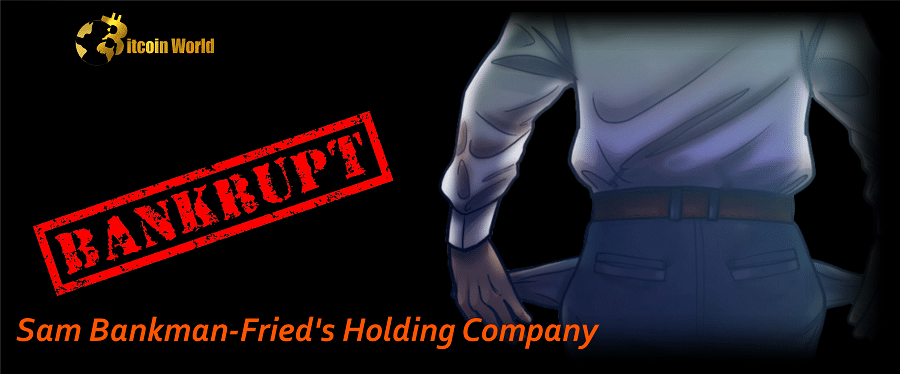The crypto world continues to reel from the aftershocks of the FTX collapse, and the latest development involves another key player in Sam Bankman-Fried’s empire. Emergent Fidelity Technologies, a holding company owned by the controversial crypto figure, has officially filed for Chapter 11 bankruptcy. But what does this mean, and why should you care? Let’s dive into the details.
Emergent Fidelity Technologies Files for Bankruptcy: Key Takeaways
In a nutshell, Emergent Fidelity Technologies, based in Antigua and Barbuda and controlled by Sam Bankman-Fried (SBF), has sought Chapter 11 protection in a Delaware court. This move is strategically linked to the ongoing FTX bankruptcy proceedings. Here’s a breakdown of the essential points:
- Chapter 11 Filing: Emergent Fidelity Technologies voluntarily filed for Chapter 11 bankruptcy on February 3rd in the U.S. Bankruptcy Court for the District of Delaware.
- SBF’s Holding Company: This company is owned by Sam Bankman-Fried, with him holding 90% and FTX co-founder Gary Wang owning the remaining 10%.
- Strategic Move: The Chapter 11 filing is intended to facilitate a “combined administration” with the larger FTX bankruptcy case.
- Core Asset: The company’s primary assets are approximately 55 million Robinhood shares, currently valued at over $590 million.
- Legal Battles: These Robinhood shares are at the center of a legal tug-of-war, involving BlockFi, FTX creditors, and even the U.S. Department of Justice (DOJ).
Why Chapter 11 and Why Now?
You might be wondering, why did Emergent Fidelity Technologies choose to file for Chapter 11? According to court documents and a declaration by Angela Barkhouse, one of the Joint Provisional Liquidators in the case, the move is primarily to:
- Seek Joint Administration: By filing in the same court as FTX, Emergent Fidelity aims for a streamlined process to manage its bankruptcy alongside FTX’s complex case.
- Protect Assets and Creditors: The Robinhood shares are the company’s “only known assets,” and multiple parties are claiming ownership. Chapter 11 provides a legal framework to defend these assets and protect the interests of creditors amidst these competing claims.
- Address Lawsuits: Emergent Fidelity was already facing a lawsuit from BlockFi concerning these very Robinhood shares. Chapter 11 offers a structured way to handle this and other potential legal challenges.
The Robinhood Shares: A Key Point of Contention
The 55 million Robinhood shares are not just numbers on a screen; they represent a significant point of contention in the FTX saga. Here’s why they are so important:
- Valuable Asset: Valued at over $590 million, these shares represent a substantial asset pool that could be used to repay creditors in the FTX and related bankruptcies.
- Confiscated by DOJ: Adding to the complexity, the U.S. Department of Justice seized these shares (along with $20 million in cash) in January as part of the broader legal actions against FTX and its executives.
- Multiple Claimants: Besides Emergent Fidelity’s claim of ownership, BlockFi, FTX creditors like Yonathan Ben Shimon, and potentially others are vying for these shares.
This situation creates a complex web of legal claims and counterclaims, highlighting the intricate financial entanglements within the FTX empire.
Who Owns Emergent Fidelity Technologies?
Let’s break down the ownership structure of Emergent Fidelity Technologies:
| Owner | Percentage |
|---|---|
| Sam Bankman-Fried | 90% |
| Gary Wang (FTX Co-founder) | 10% |
As you can see, Sam Bankman-Fried holds the vast majority stake in the company. It’s also worth noting the status of the owners:
- Sam Bankman-Fried: Faces criminal prosecution, with his trial expected to begin in October.
- Gary Wang: Has already pleaded guilty to fraud charges related to the FTX collapse.
What Does This Mean for the FTX Bankruptcy and Crypto Investors?
The bankruptcy filing of Emergent Fidelity Technologies adds another layer of complexity to the already massive FTX bankruptcy case. For crypto investors and those affected by the FTX fallout, here’s what to consider:
- Prolonged Legal Process: This filing suggests that the legal and financial fallout from FTX will continue for an extended period.
- Asset Recovery Challenges: The fight over the Robinhood shares illustrates the challenges in recovering and distributing assets in such complex bankruptcy cases, especially when multiple jurisdictions and claimants are involved.
- Transparency Concerns: The opaque structures of companies within the FTX ecosystem, like Emergent Fidelity Technologies, raise questions about transparency and accountability in the crypto industry.
Looking Ahead
The Emergent Fidelity Technologies bankruptcy is a significant development in the ongoing FTX saga. It underscores the far-reaching consequences of the exchange’s collapse and the intricate legal battles that are unfolding. As the case progresses, keep an eye on the fate of the Robinhood shares and how this bankruptcy impacts the overall recovery process for FTX creditors. The crypto world is watching closely as these events continue to shape the future of the industry.
Disclaimer: The information provided is not trading advice, Bitcoinworld.co.in holds no liability for any investments made based on the information provided on this page. We strongly recommend independent research and/or consultation with a qualified professional before making any investment decisions.




